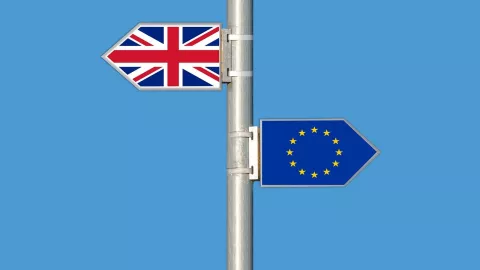
Brexit and MS
On Christmas Eve, the UK and EU announced that they had agreed a trade deal. This sets out the terms of their future relationship after the post-Brexit transition ended on 31 December 2020.
We know Brexit has caused a lot of uncertainty for people across the UK. So we’ve looked at what the trade deal means for the MS community.
What does the trade agreement mean for my medicines?
The UK and the EU agreed to zero tariffs on medicines and medical devices coming in and out of the UK. This means that the UK will continue to import these goods freely from Europe as it has done. This should avoid disruption to the supply of medicines and medical devices.
We'll continue to keep an eye on this, and advise if there are any concerns about access to MS treatments
Should I be stockpiling my medicines?
Storing prescribed medicines could mean you’re not following your doctor’s recommendations on when they should be taken. It could also lead to medication going out of date.
We’ve been assured there are arrangements in place to avoid any shortages. The trade deal should ensure continued supply of medicines to the UK.
For now, you should follow your doctor’s advice and avoid stockpiling prescribed medicines. If your doctor or pharmacist has told you anything different, please email us at [email protected]
Will the cost of my medicines go up?
Prescriptions in Scotland, Wales and Northern Ireland will remain free.
The UK and the EU have agreed to zero tariffs on medicines and medical devices coming in and out of the UK. In England, if you currently pay for your prescription, there’s unlikely to be a price increase due to Brexit.
Although prescriptions occasionally increase in cost - this increase would be shared across all medications. This means the set price for a prescription would rise, but a rise should be minimal.
Will the availability of new treatments be affected by Brexit?
Before Brexit, the European Medicines Agency (EMA) was responsible for approving new medicines. This will no longer be the case.
The body that regulates medicines in the UK is the Medicines and Healthcare products Regulations Agency (MHRA). Both the MHRA and the government have said making our system for licensing drugs as similar as possible to the EU’s is a priority. This should mean we can still access new medicines quickly.
We’re continuing our Treat Me Right campaign to make sure people can get access to the right treatment at the right time.
Will the deal affect medical research?
The UK will continue to take part in the EU’s scientific research and innovation programme, Horizon Europe, to collaborate on researching and developing new treatments.
The UK and EU have agreed to facilitate movement of researchers with as few barriers as possible, now that freedom of movement has ended.
Will my care worker be able to remain after Brexit?
Yes, if your care worker is from Europe and have lived in the UK for the past 5 years or more, they have the right to stay in the UK. They can either apply for ‘indefinite leave to remain’ which entitles them to live and work in the UK for a further 5 years, or they apply to become a permanent citizen.
However, it will be harder for care workers to come to UK from other countries. On 1 January 2021, the UK government launched a new Health and Care Worker visa. The vast majority of care workers won’t be eligible, because they aren’t paid the minimum salary requirement of £20,480 a year.
We updated this blog on 14 January 2021.
Looking for information and emotional support?
Our MS Helpline is here for you on freephone 0808 800 8000. We're here Monday to Friday, 9am to 7pm except bank holidays.
Or you send us a direct private message on Facebook messenger between 9am and 5pm Monday to Friday. We also have a confidential email service: [email protected]. So drop us a line and we’ll get back to you within five working days.




